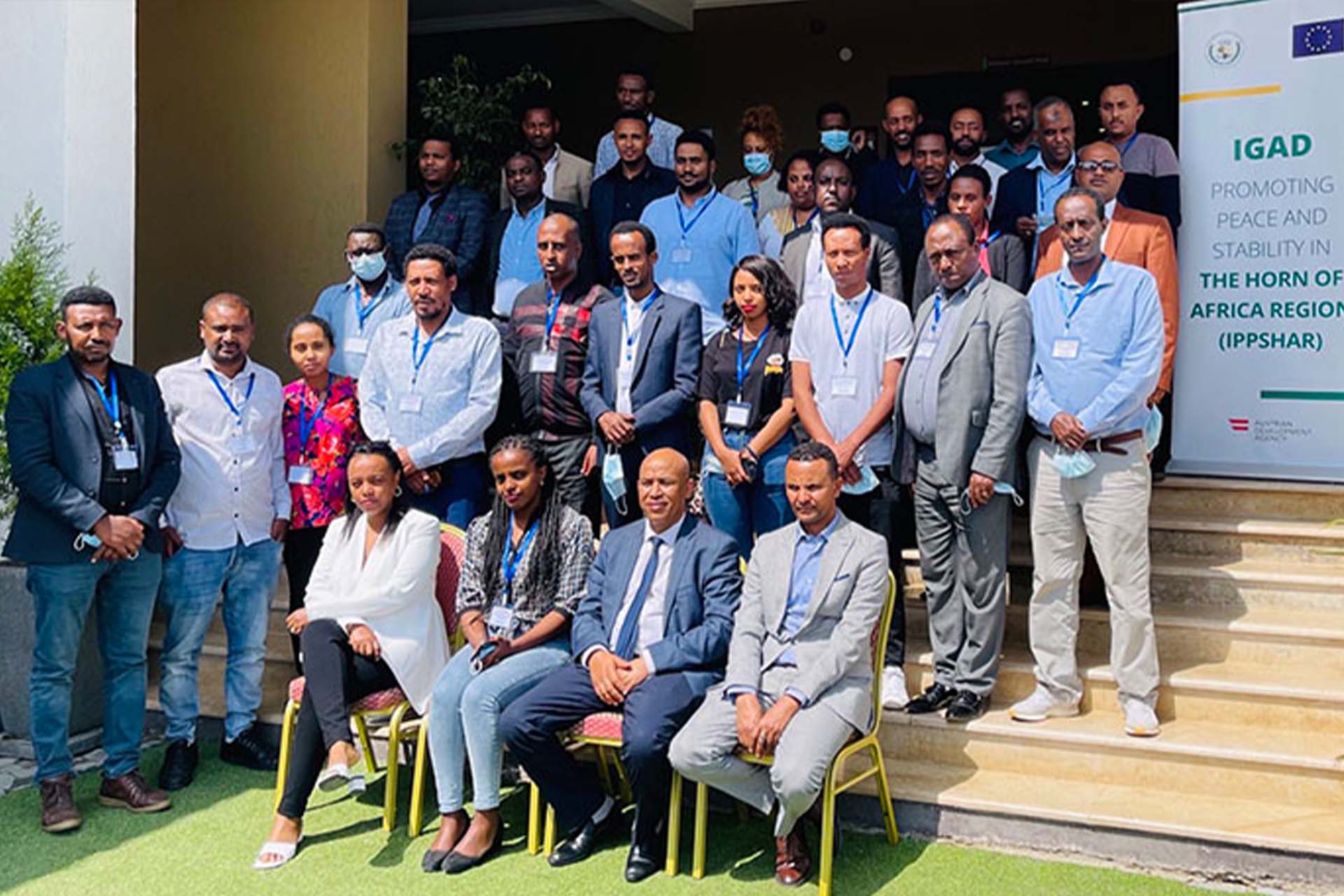
3 October 2021, Adama, Ethiopia – The IGAD Security Sector Program (IGAD SSP) successfully conducted a five days national training on “The Role of Technology and Social Media Platforms as Recruitment Tools for Terrorist Networks and the Challenges for Security Institutions” held on 28 September – 02 October 2021 in Adama, Ethiopia.
One of the Transnational Security Threats (TSTs) that affect all IGAD Member States is Terrorism. Terrorism has been evolving and many factors have contributed to its changing nature. These factors are interlinked and interconnected by actors, space, and enabling infrastructure or environment. It has become instantaneous and unpredictable affecting many societies and at the same time reaching a wide audience because of technology. Cyberspace is an environment without boundaries, a privileged place where terrorists find resources, make propaganda activities, recruit and mobilize sympathizers, disseminate information, provide training, secure communication, or even launch attacks. Social media is an essential element of terrorism whereby terrorist networks fully utilize to their advantage. Terrorists use popular online platforms such as Twitter, Facebook, and YouTube with a direct and straightforward language that attracts young individuals through the use of images and videos with high emotional impact. In addition, messaging is amplified through easy dissemination of content by the use of emails, texts and mobile applications by sympathizers and media outlets.
It is with this background in mind that this training was conducted with the objective of equipping trainees with an advanced knowledge and practical skills on the use of technology specifically Internet and Social Media Platforms to effectively craft and utilize preventive and countering terrorism measures by providing the tools and means of surveillance, tracking and intercepting recruitment methods of terrorist groups in order to strengthen the capacity of Member States’ Security Institutions and their ICT infrastructure.
The training was officially opening by the guest of honour, Hon. Siraj Fegessa – Director of IGAD Peace and Security Division. Hon. Siraj thanked the Government of the Federal Democratic Republic of Ethiopia for hosing this very important and timely training. He further welcomed the participants and appreciated their commitment to engage in this training.
The Director emphasized that as terrorist networks are very much active online in various social media platforms, a proactive approach in identifying and managing these activities is needed whereby security institutions face various challenges in terms of infrastructure & capacity, access to information, balancing between privacy and security, upholding human rights principles, right to freedom of expression and the rule of law, maintaining national security, and so on. Accordingly, Hon. Siraj signaled the importance of enhancing the capacity of information, communication, and technology practitioners as well as the law enforcement officials.
A total of 34 practitioners from Ethiopia’s Federal Police, National Intelligence and Security Services (NISS), Information Network Security Agency (INSA), Attorney General’s Office, Ministry of Innovation and Technology, Ethio Telecom, and the Artificial Intelligence unit within the Office of the Prime Minister participated bringing together vast experience to promote a multi-agency approach and cooperation among these institutions who directly deal with the threat. The training was facilitated by well-versed and professional professors from the School of Information Technology and Engineering at the Addis Ababa Institute of Technology who have provided theoretical and practical as well as hands-on technical tools that will assist in the day-to-day works of these practitioners.
The following were the major topics covered during the five days, whereby they have been extensively discussed through lecture presentations, group discussions, interactive sessions and live demonstrations.
- Transnational Security Threats (TSTs) and the Cyberspace
- Cybersecurity – concepts, terminology, etc
- Internet security and vulnerability in Ethiopia
- ICT architecture and Internet access in Ethiopia
- Technology and terrorism – how terrorist networks exploit Internet platforms from national, regional and international perspectives
- The data and social media landscape of Ethiopia – Ethiopian online
- Social media presence – terrorist networks vis-à-vis security institutions
- Legal instruments on technology, social media and terrorism
- Information versus privacy, access to online information, issues of human rights
- Vulnerable people, potential terrorists, and sympathizers of terrorist groups targeted through online recruitment – identification, assessment, approach, etc
- Online investigation tools and mechanisms (OSINT)
- Internet surveillance
- Dark net and deep web – concepts, access, usage, tools
- Challenges and opportunities for security institutions and relevant agencies
Participants at the end appreciated the content, methodology and approach of the training and requested IGAD to continue to provide such kinds of on-hand training that will help them build their individual knowledge as well as their institutional capacity. At the end of the training, they came up with a way forward with clear recommendations that will be applied by various stakeholders including the Government, regional and international organizations.
One of the mandates of the IGAD Security Sector Program (IGAD SSP) is to enhance the institutional and human capacities of Member States to effectively address the emerging, evolving, and existing transnational security threats (EEE-TSTs) in order to contribute to regional peace and stability and foster enabling environment for regional integration and development of the sub-region, under which this training was conducted.
The training was conducted with the financial support from the European Union Trust Fund (EUTF) through the Austrian Development Agency (ADA) under the IPPSHAR Program.

